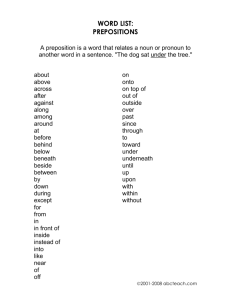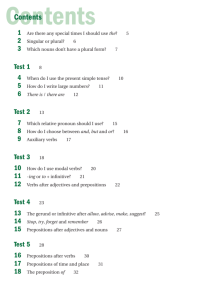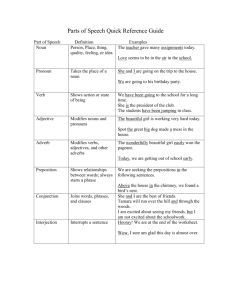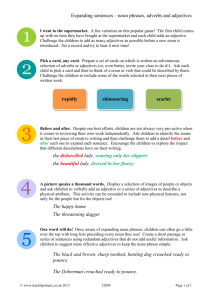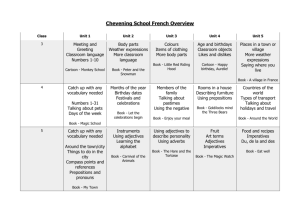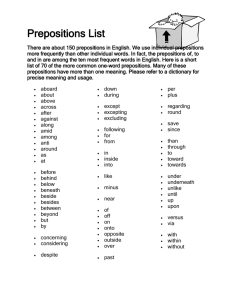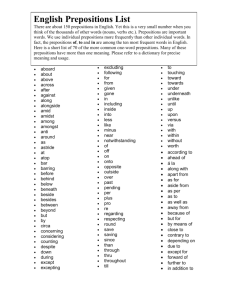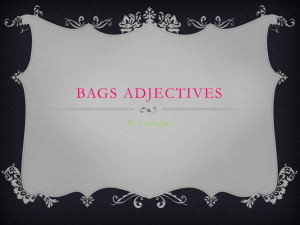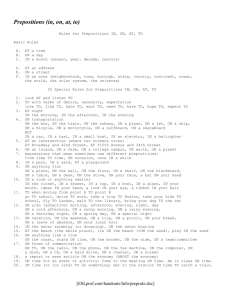Creating People and Places unit 6
advertisement
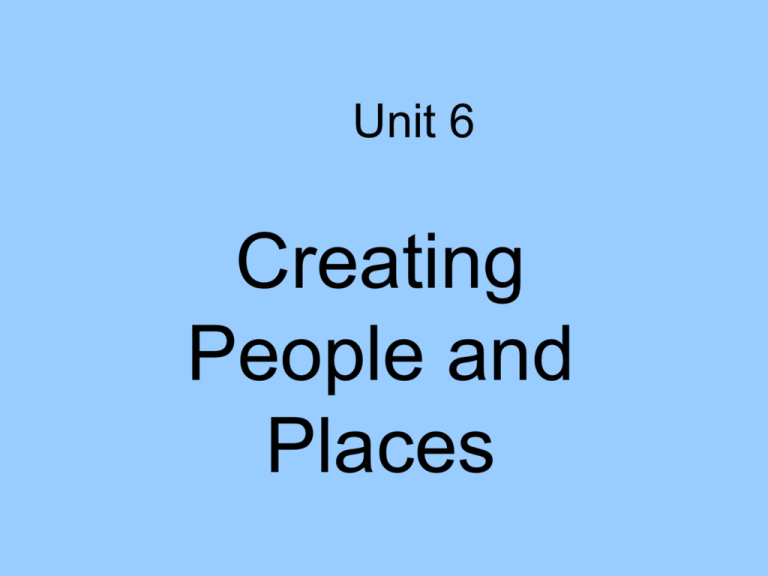
Unit 6 Creating People and Places Unit Objectives This unit will help you to; Describe places and characters in different ways Find different ways of grabbing your readers attention Choose and use interesting vocabulary Structure paragraphs effectively Plan draft and present your work Zooming In Learning Outcome: • Use the technique of ‘zooming in’ to make details more interesting for the reader • Use prepositions in my writing Key words Prepositions Prepositions • Prepositions tell you where something is situated or how it is positioned Examples: Here By Against Below Under Over In Dangerous games 1) 2) 3) 4) 5) 6) I was playing football …………the street. Suddenly the ball bounced …………….. the pavement. It rolled ……….. the road. Without thinking I chased ……………. the ball. Rajiv shouted me to stop. It was too late. A car was coming ……………. me. All kinds of thoughts went ……………….. my mind. Then the car hit me and knocked me …….. the road. I could hear it as it went ……………. me. Then I passed out. I don’t remember anything else. Rajiv says they put me ……… a stretcher and then drove me ……….town by ambulance. I suppose they must have done because I woke up ….. the hospital. …………………….. coming round though, I had a strange experience. Dangerous games 1) I was playing football IN the street. Suddenly the ball bounced 2) 3) 4) 5) 6) OFF the pavement. It rolled INTO the road. Without thinking I chased AFTER the ball. Rajiv shouted me to stop. It was too late. A car was coming TOWARDS me. All kinds of thoughts went THROUGH my mind. Then the car hit me and knocked me INTO the road. I could hear it as it went PAST me. Then I passed out. I don’t remember anything else. Rajiv says they put me ON a stretcher and then drove me ACROSS town by ambulance. I suppose they must have done because I woke up …IN.. the hospital. BEFORE coming round though, I had a strange experience. across behind above beside down to around Descriptive writing in prose PROSE is __________________________________ __________________________________ __________________________________ __________________________________ _____________. Zooming In Once upon a time there was a ____, _____ planet. On the _____, ______ planet was a _____, _____ city. In the _____, _____ city was a _____, _____ building. Behind the _____, _____ building was a… Descriptive writing in prose oming Zo in When you describe something in writing, you have to decide where to begin and end your description. One way to do this is to imagine you are filming a scene and zooming in. Read Dark, Dark Tale Lesson 3 Lesson Objective To learn how to focus your reader through the use of detail Lesson Outcome By the end of the lesson I will use the technique of ‘zooming in’ to add detail and description to my writing Once upon a time there was a… Planet Island Motorway Continent Seashore Road Country Jungle Fields City River Farm Street Waterfall Farmhouse Shop Cave Barn Room Tunnel Ladder Corner ? ? Cupboard Drawer Remember to: Box • Include prepositions ? • Include adjectives • Aim for at least 10 lines Descriptive Writing Learning Outcome • Focus your reader by using detailed description • Vary your sentence length Key words Detail, description PAGE 64 Detail in prose ACTIVITY 2 Answer questions 1-4 in your yellow book (10 mins) 1) Pond dust cobwebs mouse 2) 4: in corner / Tuck / Forgotten / Shotgun. The sentence is short for effect. The short sentence is at the end as a powerful cliffhanger. 3) The writer used a new sentence beginning with ‘and’ to create the effect of a list. 4) Repetition : every, and, comma use (b) for effect (c ) to create the effect of a list. Using the unexpected Activity 3 Write the final sentence from ‘Tuck Everlasting’, and replace the shotgun with something else that is unusual in order to surprise your reader. Remember, the item needs to be realistic. For example, And in a corner stood Tuck’s forgotten pram. And in a corner stood Tuck’s forgotten alcohol. And in a corner stood Tuck’s forgotten bible. Activity Your task is to write a description of the inside of a house. Imagine yourself walking through the front door and into one of the rooms. Use noun phrases and prepositions to describe the objects in the room. Zoom in on a final surprise. Use ‘Tuck Everlasting’ as a model and aim for only 5 sentences. Example: I walked into the scruffy little house beside the grave yard; my eyes fell upon the battered front door, the rusty door knocker and the spider dangling from the door handle. I made my way into the… Example: I walked into the scruffy little house beside the grave yard; my eyes fell upon the battered front door, the rusty door knocker and the spider dangling from the door handle. I made my way into the… Describing a Place Learning Outcome • To use noun phrases in my writing • To describe a place and focus on more than one of the five senses Key words • Noun phrase • Adjective • Senses Noun phrases The job of an adjective is to describe a noun Activity Place two adjectives in front of these nouns to make a noun phrase 1. _________, __________ water 2. _________, __________ ice 3. _________, __________ night 4. _________, __________ problem 5. _________, __________ face 6. _________, __________ door Page 67 Skellig TASK: Read Skellig, and discuss Activity 5, parts 1,2 and 3. Then complete the chart in part 4 Effective choice of words Writer’s choice Alternative word Explanation Scuttled Moved Tiptoed Walked Snapped Broke Scattering Running Peered Looked Effective choice of words Writer’s choice Scuttled Alternative word Explanation Moved Unusual word Tiptoed Walked Makes the movement very visual for the reader Snapped Broke Scattering Running Peered Looked Onomatopoeia for effect Sound of the word mirrors the action For emphasis of the action Describing a place Activity 6 Look at the pictures on page 69. Think about the setting, possible characters, possible dates for the pictures, what you may be able to see, hear, taste, touch and smell if you were at that building. Imagine you are at the building (just as you imagined being at your house and described it as you moved around the house). Write a description of the building using Interesting vocabulary – noun phrases Prepositions Thoughtful sentence structure Zooming in on a character that you find there (This will be your marking criteria) Using vocabulary to create atmosphere You really can choose vocabulary to create atmosphere with anything. Take the humble apple, for example. How might we describe this apple in different settings? In a hot summers kitchen: In an infested squatter’s kitchen: • • • • • • • • • • • • • • • Round Rosy Juicy Shiny Tempting Crunchy Fresh Salad Rotten Maggot Bruised Brown Battered Dry Nauseating Using verbs to describe a character Learning Outcome Select verbs and adjectives that contribute to character description Key words Description Verbs adjectives The bent, old man limped slowly down the street. Change the verb, adverb and adjectives so that you are describing a younger person. Describing a Character Activity: Describe the character that you found in the building, in the work you did last lesson 1. Describe the character’s face, using adjectives and verbs. Describe: face, eyes, hair, mouth, nose, expression. 2. Describe the position of your character using prepositions. 3. Describe their clothes. 4. Describe how they react to you – e.g relief, fear, suspicion… 5. Include a short conversation between you and your character. End of Unit Assessment SECURE • • • • • Keep your writing in the past tense! Describe what can be seen, felt, heard, smelt and tasted In your writing use adjectives that create atmosphere and mood Write in paragraphs – beginning, middle and end Use basic punctuation accurately e.g. capital letters, commas and full stops EXCEEDING • In your writing use noun phrases, similes and prepositions to create imagery in the mind of the reader • Write with detail and description in developed paragraphs • Use common punctuation accurately e.g. ! ? HIGHEST • Use the range of punctuation accurately, including speech punctuation • Use a variety of sentence lengths and styles • Use a variety of sentence openings – (‘ing words ‘ly’ words and connectives)
